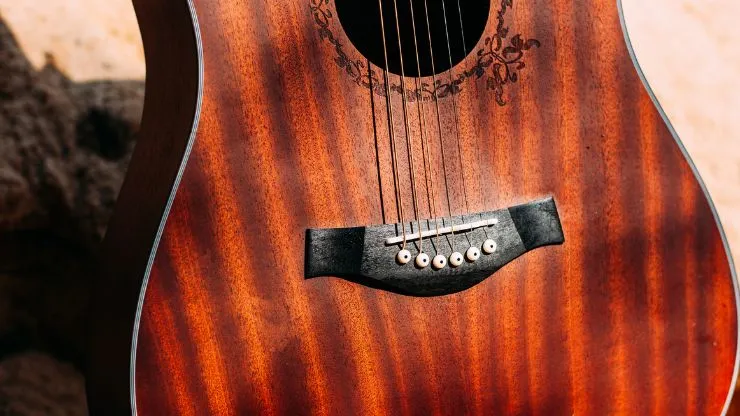A popular pick for decades, mahogany has been the wood of choice for some of the most iconic instruments ever created. So, what is mahogany tonewood, and why is it so awesome?
What Is Mahogany?
Mahogany is a tropical hardwood tree species native to the Americas. There are three different species commonly found, but the one most often seen in guitar-making is Swietenia macrophylla, otherwise known as Honduran mahogany. It’s generally sustainable and highly prized as a furniture material due to its attractive finish, density, durability, and ease of working. And it’s these same reasons that make mahogany a great tonewood option for guitars.
How Do Mahogany Guitars Sound?
Mahogany offers a warm and full tone that is perfect for a wide range of genres, though it’s particularly popular in rock and metal. It has a naturally boosted mid-range response with a decent low end, making it perfect for chuggy rhythm riffs. Thanks to the density of the wood, you’ll get a solid tone and sustain for days. In acoustic guitars, mahogany is an excellent choice for body backs and sides. Its strong bottom end and colossal mid-range make it a balanced choice for many playing styles, while its woodiness pairs nicely with steel strings.
What Are the Pros and Cons of Mahogany Guitars?
Some of the advantages of mahogany tonewood include the following:
| Pros | Cons |
|---|---|
| Warm, well-rounded tone | Fairly heavy |
| Strong mid-range performance | Less strong top end |
| Durable wood that isn’t easily damaged | It can be lacking in crispness or clarity |
| Incredible sustain | Not as visually striking as other options |
| Easy to work with | More expensive |
| Ages well |
Who Is Mahogany Tonewood Best Suited To?
The natural EQ profile of mahogany makes it the ideal choice for those who play blues, jazz, rock, and metal. Its mid-range sound and great crunch is particularly suitable for heavy rhythm guitar. Mahogany guitars, such as Gibson’s SG and Les Paul models, have been the weapon of choice for some of rock’s most iconic guitarists, from Black Sabbath’s Tony Iommi to modern giants such as Adam Jones of Tool, Mastodon’s Bill Kelliher, and Matt Heafy of Trivium.
Who Should Avoid Mahogany Tonewood?
While mahogany’s mid-range is unbeatable, anyone that trades in treble should look elsewhere. Pop and indie guitarists, who might need more top end to get that traditional jangly sound, will be better off with an ash or alder body. And while mahogany is essential for metal rhythm, shredders may find the wood to be a little too muddy.
Why Is Mahogany Used for Guitars?
With its durability, ease of working, and balanced tone, mahogany is an excellent option for guitar makers. It has loads of character in the tone department and a subtle but attractive grain that makes for a simple, elegant finish.
Are Mahogany Guitars Durable?
In a word - yes! Mahogany is strong, dense, resilient, and naturally resistant to water and wood rot. In addition, it’s also less likely to warp over the years. With a bit of love and care, a quality mahogany guitar will be a solid investment for years to come.
Are Mahogany Guitars Easy To Maintain?
Thanks to its natural durability, you don’t need to follow any special guidelines to keep your mahogany guitar in good condition. Just take the typical steps of guitar maintenance:
- Store at a stable temperature and humidity
- Clean with a good quality guitar polish
- Dust your guitar with a non-abrasive microfiber cloth
- Where possible, keep your guitar in a case when it’s not in use.
Are Mahogany Guitars Good?
Whether you think a mahogany guitar sounds good or better than another tonewood is mostly subjective. Its sound will suit some ears more than others and is better fitted to certain styles and genres. Several variables will also change a mahogany guitar’s sound. The wood used for the neck, fretboard and top will change things, and, in the case of electric guitars, hardware such as the pickups will also play a massive part in the final sound. But what isn’t in question is the quality of a good mahogany guitar. With its stable and resilient nature, a mahogany guitar should stay in tip-top condition for years.
How Do Mahogany Guitars Age?
When it comes to ageing, a good piece of mahogany is like a fine wine. Over the years, wood will naturally dry out. As a mahogany guitar ages, the sap inside will crystalise and add a harder, more rigid property to the instrument. And due to their natural resilience and resistance to rot, they’re easy to maintain.
Do Mahogany Guitars Sound Better With Age?
Some think the ageing process adds even more resonance and a mellow quality to the tone. Others argue that the sound always comes down to the initial quality of the wood used. Ultimately though, there’s a reason why vintage mahogany Gibson Les Pauls from the 1950s and 60s go for so much money nowadays!
Do Mahogany Guitars Get Darker?
Besides its subtle and straight grains, mahogany is well-known for having eye-catching reddish-to-pink tones. Over time, as the wood is exposed to sunlight, its finish will darken to a rich reddish-brown. Colour changing is commonly seen in hardwoods, though the effect is less severe than in woods such as cherry or maple.
Is Mahogany the Best Wood for Guitars?
Picking the ‘best’ tonewood is like choosing the best guitar pickup. It completely depends on the noise you want to make and your personal preferences. That said, there’s a reason why some of the most important guitars ever created use mahogany bodies. It’s hard to find a better tonewood to get the mid-range boost needed to make a guitar stand out in a mix, and the sustain is second to none. Mahogany certainly justifies its position as one of the go-to tonewoods.
Mahogany Tonewood Alternatives
If mahogany isn’t for you, then never fear; plenty of alternatives are available. For a more scooped mid sound, with accentuated highs and lows, then rosewood might be for you. If you want to put a stronger emphasis on treble, then consider maple. Or, for a combination of mahogany’s mid-range prowess and the brightness of maple, then walnut might be the one.
Finding the Right Mahogany Tonewood Guitar
Now that you know the facts about mahogany, it’s time to find your guitar! Head over to our Finder tool, where you can enter search parameters to find your perfect mahogany guitar.

